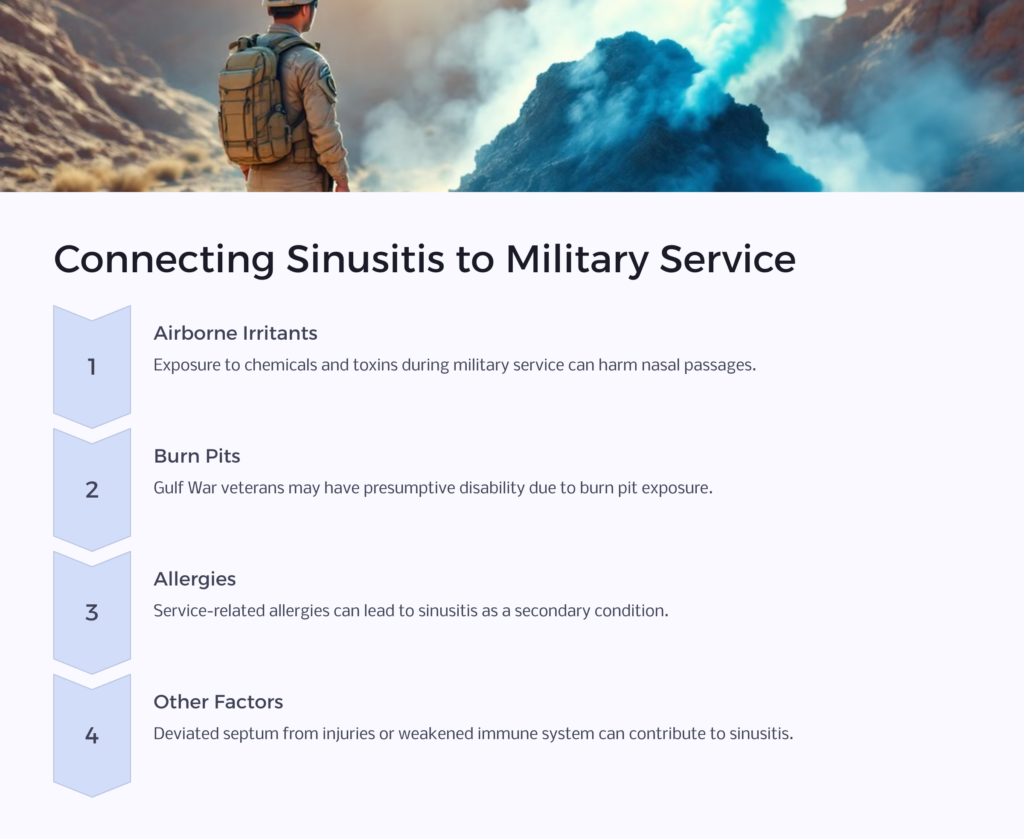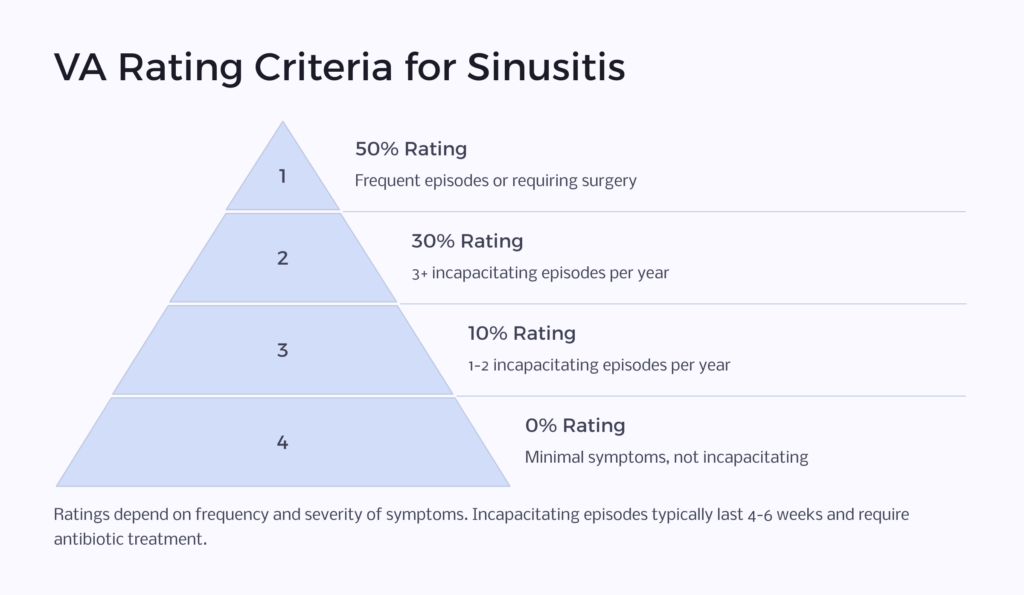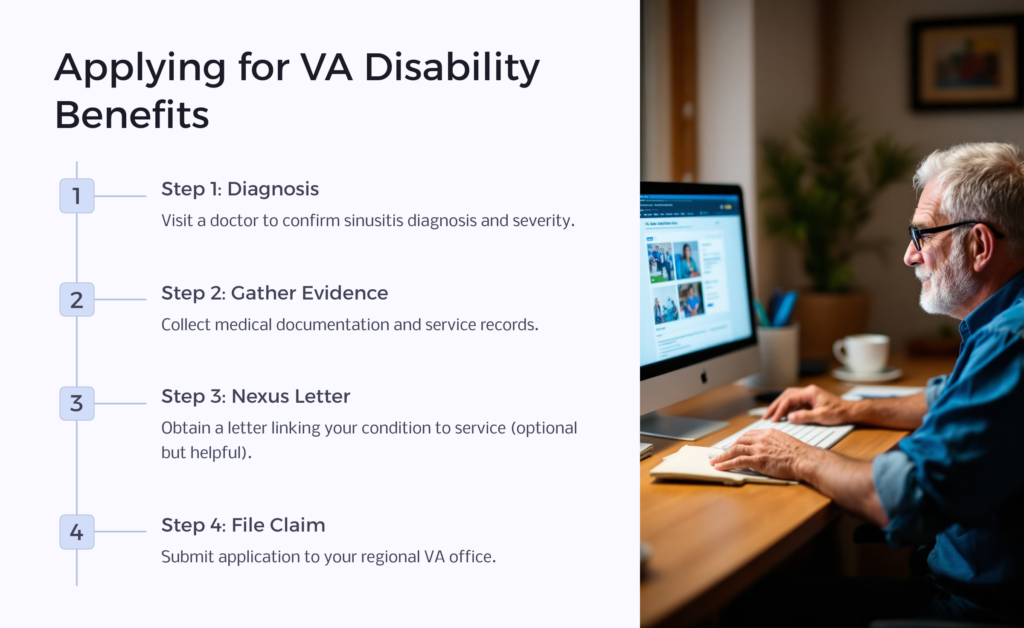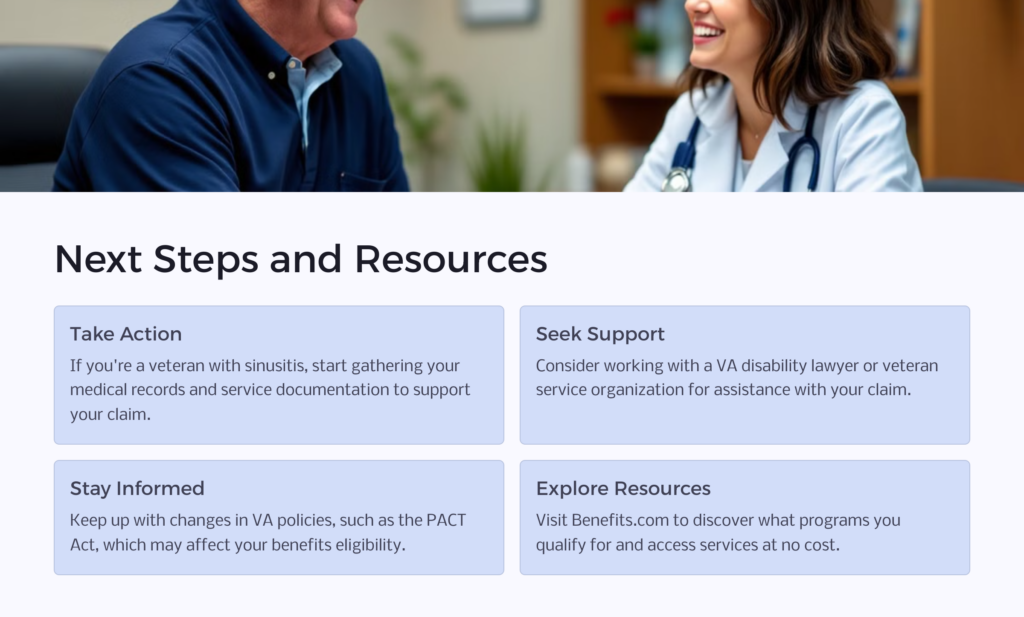The U.S. Department of Veterans Affairs (VA) considers respiratory conditions like sinusitis as potential disabilities that affect veterans. When you submit a VA claim for disability benefits based on a chronic sinusitis diagnosis, the VA reviews the claim, your symptoms, and medical evidence. Then, it assigns a sinusitis VA rating, which may lead to disability compensation.
Although it shares some symptoms with allergic rhinitis and other respiratory conditions, sinusitis is a separate condition that can affect military service personnel, especially Gulf War veterans. Learn about the details of sinusitis, connecting sinusitis to your service, and how to determine your eligibility for disability coverage.
What Is Sinusitis?
Sinusitis is a condition that affects the sinuses, which make up a large part of the face. These spaces reside near the cheekbones, eyes, and forehead and make the mucus that lines the interior of your nasal passage. Sometimes, the sinuses become blocked, making them unable to drain correctly. The sinuses can become inflamed and irritated when the built-up fluid becomes infected.
Symptoms of Sinusitis
Sinusitis can start with just a few small symptoms that don’t interfere with daily life for a day or so. Other bouts of sinusitis hit hard and fast, causing severe breathing problems from the start. Common symptoms of sinusitis include:
- Altered sense of smell or taste
- Bad breath
- Cough
- Facial tenderness or swelling
- Fatigue
- Fever
- Hoarse voice
- Nasal congestion
- Persistent headache
- Pressure in the ears
- Runny nose
- Sinus pressure or pain
- Sore throat
- Thick, colored nasal discharge
Acute vs. Chronic Sinusitis
Sinusitis can either be acute or chronic. Acute sinusitis is a temporary form of the condition that can cause the same symptoms as chronic sinusitis, making it important for veterans to be aware of these similarities. The symptoms of acute sinusitis may last up to a few weeks due to a bacterial or viral sinus infection.
Chronic sinusitis can present with all the symptoms of acute sinusitis except that it tends to last much longer. While acute sinusitis might cause symptoms for a few weeks, chronic sinusitis can last as long as 12 weeks or more with little to no relief.
Connecting Sinusitis to Your Service

As many factors can cause sinusitis, you must connect your condition to your service. Common causes of sinusitis for veterans include exposure to airborne irritants or burn pits, allergies, or a deviated septum. Other medical conditions caused by service can also lead to sinusitis, such as tooth infections or a weakened immune system.
Airborne Irritants
Sinusitis can affect anyone, but active duty service members and veterans could be more vulnerable than the general population because of their daily duties in military service.
One such trigger that affects military service members more than others is airborne irritants. Military exposure to chemicals and toxins in the air is common while testing or repairing equipment or fighting overseas. These irritants can harm the nasal passages, causing acute or chronic bouts of sinusitis.
Burn Pits
Burn pit exposure is another VA disability sinusitis risk factor for veterans, especially those who served in the Gulf War. These veterans sometimes experience “Gulf War syndrome,” which includes several symptoms tied to military service, some of which may have been caused by burn pits.
Veterans who were exposed to burn pits during their service and have since developed sinusitis could have a presumptive disability under VA rules.
Allergies
Allergies are a leading cause of sinusitis because of their ability to irritate the sinuses frequently and for prolonged periods. Technically referred to as allergic rhinitis, allergies sometimes mimic the symptoms of sinusitis, making it difficult to tell which condition you have.
To receive VA disability benefits, a veteran with allergies and sinusitis should have medical evidence proving both so that the VA can determine an accurate disability rating for compensation.
Deviated Septum
The septum is the thin wall that sits between your nostrils. A deviated septum refers to a septum that is crooked or displaced to one side, which can cause breathing issues due to narrowed nasal passages. The condition sometimes occurs with a broken nose or nose injury.
Over time, deviated septum symptoms can contribute to nasal irritation and sinusitis. Severe conditions sometimes require surgical treatment.
Other Medical Conditions
Other medical conditions can also lead to sinusitis. For example, any conditions that weaken the immune system, such as HIV, can make it more difficult for your body to fight sinus infections. Tooth infections can also cause fluid buildup in the sinuses, which can become infected and cause sinusitis.

Determining Your Sinusitis VA Rating

Typically, the VA rates chronic sinusitis as 0%, 10%, 30%, or 50%. To receive at least a 10% VA disability rating, you must experience at least one or two long-lasting, incapacitating sinusitis episodes annually that require antibiotics. A 30% rating is determined with three or more episodes, and a 50% rating is reserved for veterans with frequent episodes or those requiring surgery as treatment.
VA disability sinusitis ratings vary depending on your symptoms and whether your sinusitis is acute or chronic. Typically, the VA will only approve a VA disability claim for chronic sinusitis, as the condition can be long-term or permanent.
As of 2021, the VA began using a presumptive service connection process for eligible veterans who could have been exposed to sinusitis-causing pollution during their service. These veterans must have served in one of the Southwest Asia military service areas, including Afghanistan and Syria, and have developed chronic sinusitis within 10 years of their service.
Sinusitis as a Secondary Condition
The Veterans Benefits Administration may also provide a VA disability rating for chronic sinusitis as a secondary condition to another condition with a service connection.
For instance, chronic sinusitis can stem from allergies, and a veteran’s allergies may have been a result of burn pit exposure during their service. In this case, the VA may consider sinusitis a secondary disability for veterans’ benefits and additional disability compensation.
Increasing Your Sinusitis VA Rating
If you have already received a sinusitis VA rating, you may request an increase based on the continued development of your symptoms. A higher sinusitis rating is tied to having more frequent and severe symptoms.
To increase your existing sinusitis VA rating, you will need to reapply. Don’t forget to gather your medical records, including detailed symptom documentation and supportive statements from medical professionals.
Applying for VA Disability for Sinusitis

Veterans can apply for VA disability benefits for chronic sinusitis by visiting their regional VA office, calling the VA, mailing in their forms, or filling out online forms. Each veteran should provide ample medical evidence to prove their diagnosis, condition’s severity, and connection to their military service.
To apply for VA disability benefits, you’ll need to:
- Visit a doctor to confirm your sinusitis diagnosis and severity.
- Gather medical documentation and evidence.
- Obtain an optional nexus letter linking your condition to your service.
- Contact your regional VA office and file your application.
If you need help filing your disability claim for VA benefits, consider working with a VA disability lawyer, especially one who’s experienced in claims for VA disability for sinusitis. Your lawyer can help you gather the paperwork you’ll need, file your claim, and inform you of your claim’s status and, if necessary, the appeals process.
Total Disability Individual Unemployability (TDIU) for Sinusitis
Total Disability Individual Unemployability (TDIU) is a benefit the VA provides to veterans who cannot work due to a service-connected disability. Due to the nature of the condition, it’s rare for TDIU to be granted to a veteran for sinusitis alone.
However, sinusitis can contribute to a TDIU request if connected to another service-related disability. If you believe you qualify, you should speak with a VA disability attorney to assemble your case.
Get Help With Your Sinusitis VA Rating
When determining your sinusitis VA rating, you want to ensure you obtain the highest possible benefits. From Social Security disability to veterans affairs, Benefits.com has helped over 200,000 people each month get their benefits. Discover what programs you qualify for, and see how you can obtain all services at zero cost. You served your country; now Benefits.com serves you.
FAQ
Can Sinusitis Cause Sleep Apnea?
Yes, sinusitis can lead to sleep apnea because of the intrusive congestion it may cause. Sinusitis can sometimes come with purulent discharge, which can clog the airways, especially when in a reclined sleeping position. Congestion is a leading cause of sleep apnea.
Sleep apnea can be considered a secondary disability to sinusitis, meaning that the condition may stem from sinusitis complications. For example, a veteran with service-connected sinusitis caused by burn pit exposure and related airborne toxins may also develop sleep apnea.
Does the PACT Act Cover Sinusitis?
Yes, the PACT Act does include chronic sinusitis; it’s considered a presumptive condition. If you were exposed to burn pits or other toxic services during your tour of service and have been diagnosed with chronic sinusitis, you may be eligible for VA benefits.
What Is the VA Disability Rating for Sinusitis?
Your sinusitis VA rating will depend on the severity and frequency of your symptoms. A disability rating can be 0%, 10%, 30%, or 50%, with the higher end of the scale reserved for veterans with frequent episodes or those requiring surgery. The more incapacitating episodes that occur, typically lasting from four to six weeks and preventing daily activities, the higher the rating assigned.
How Do You Get Diagnosed With Sinusitis in VA?
To get diagnosed with sinusitis in the VA, you will need to see a VA health care provider who can provide the proper diagnosis. You may need to have X-rays or CT scans performed during your examination to help provide a visual of your sinuses. Once a diagnosis is established, the VA will evaluate the condition to determine if it connects to your service and how much you may be eligible for disability benefits.
Is Sinusitis a Presumptive Condition?
Yes, sinusitis can be presumptive, but only in specific situations. As a part of the PACT Act of 2022, sinusitis is considered presumptive if you served in particular locations, such as Southwest Asia, or were exposed to burn pits or other harmful substances. Take our Benefits Quiz to learn about the disability benefits you may be eligible to claim.

 Benefits.com Advisors
Benefits.com Advisors
With expertise spanning local, state, and federal benefit programs, our team is dedicated to guiding individuals towards the perfect program tailored to their unique circumstances.
Rise to the top with Peak Benefits!
Join our Peak Benefits Newsletter for the latest news, resources, and offers on all things government benefits.



















